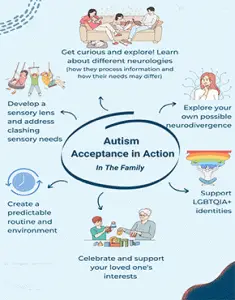Understanding Autism Impact on Families
Autism Spectrum Disorder (ASD) affects not only the individual diagnosed but also their entire family. The journey of understanding and managing autism can be both rewarding and challenging, influencing various aspects of family life. At Autism World, we recognize the profound impact autism can have on families and the importance of offering support and resources to navigate this journey.
Emotional Impact
Initial Diagnosis: Receiving an autism diagnosis can be an emotional experience for families. Parents and caregivers might feel a mix of relief, confusion, fear, and grief as they process the information. Understanding that these emotions are normal and seeking support from healthcare professionals and support groups can be immensely helpful.
Ongoing Stress: Families often experience chronic stress due to the demands of caring for a child with autism. Concerns about the child’s future, managing challenging behaviors, and navigating educational and healthcare systems can contribute to ongoing anxiety and tension.
Positive Experiences: Despite the challenges, many families report positive experiences and personal growth. The unique perspective and resilience of individuals with autism can bring joy, inspiration, and a deeper sense of empathy and understanding to family members.
Financial Impact
Therapies and Treatments: The cost of therapies and treatments, such as behavioral therapy, speech therapy, and occupational therapy, can be significant. Many families face financial strain as they seek the best possible care for their loved one with autism.
Educational Support: Specialized educational programs, private schooling, and necessary accommodations can also add to the financial burden. Additionally, some families may need to hire special education advocates or legal support to ensure their child receives appropriate services.
Employment: Parents or caregivers may need to reduce work hours or leave their jobs to provide the necessary care, resulting in a loss of income and potential career setbacks.
“Strengthening Bonds, Building Resilience: Understanding Autism’s Impact on Families”
Social Impact
Isolation: Families may experience social isolation due to the demands of caregiving and the challenges of participating in social activities. Public outings and family gatherings can be stressful, leading some families to withdraw from social interactions.
Stigma and Misunderstanding: Misunderstanding and stigma surrounding autism can affect how families are perceived and treated by others. Educating friends, relatives, and the community about autism can help reduce stigma and foster a more inclusive environment.
Support Networks: Building a strong support network of friends, family, and other parents of children with autism can provide emotional support and practical assistance. Connecting with local autism organizations and online communities can also offer valuable resources and a sense of belonging.

Sibling Impact
Emotional Reactions: Siblings of children with autism may experience a range of emotions, including confusion, jealousy, embarrassment, or guilt. It’s important to acknowledge their feelings and provide them with age-appropriate information about autism.
Responsibilities: Siblings may take on additional responsibilities, such as helping with caregiving or advocating for their sibling. While this can foster maturity and empathy, it’s crucial to ensure they have their own time and space to pursue their interests and activities.
Support for Siblings: Offering siblings opportunities to connect with peers in similar situations through sibling support groups or counselling can help them feel understood and less isolated.
Coping Strategies for Families
Education and Awareness: Learning about autism and effective strategies for managing behaviors can empower families and reduce feelings of helplessness. Attending workshops, reading books, and consulting with professionals can provide valuable insights and skills.
Self-Care: Caregivers must prioritize their own well-being to maintain their physical and mental health. Regular exercise, hobbies, and time for relaxation are essential for preventing burnout.
Professional Support: Seeking support from therapists, counselors, or support groups can provide a safe space for expressing emotions and receiving guidance. Family therapy can also help improve communication and strengthen relationships within the family.
Advocacy and Empowerment: Becoming an advocate for your child and connecting with autism advocacy organizations can empower families and help them navigate educational, medical, and social systems more effectively.

